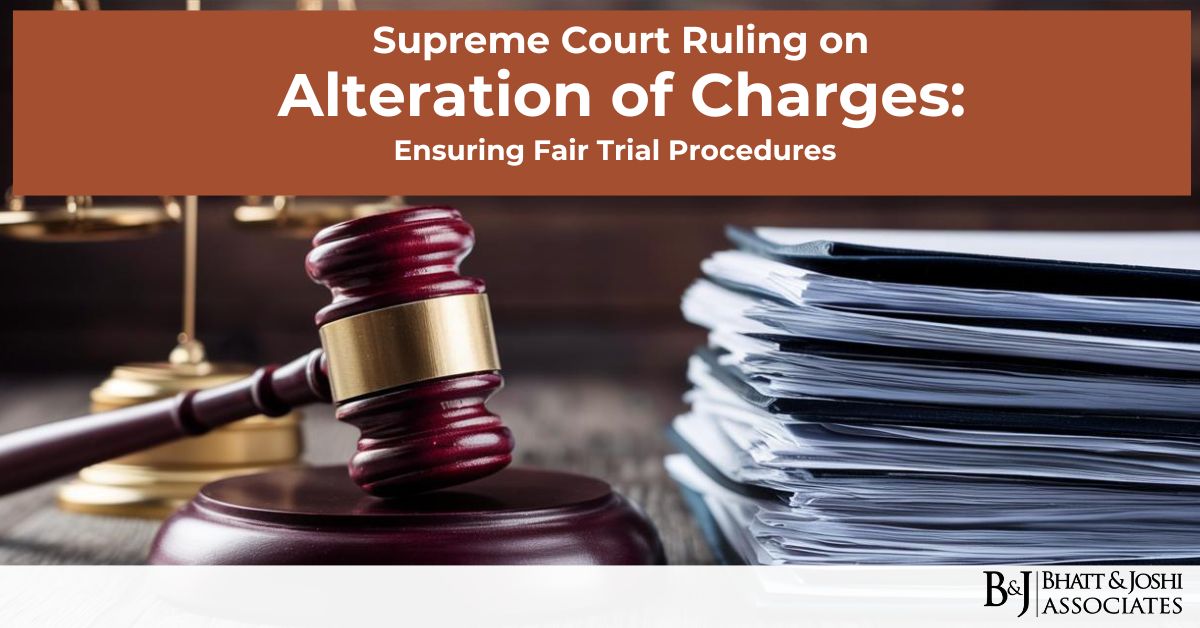Supreme Court Ruling on Alteration of Charges: Ensuring Fair Trial Procedures
 Introduction
Introduction
In a recent landmark judgment, the Supreme Court of India held that any alteration of charges during a trial must be accompanied by opportunities for the parties to recall or re-examine witnesses. Additionally, the reasons for such alterations must be explicitly recorded in the judgment. This ruling underscores the importance of procedural fairness and transparency in criminal trials.
Case Background
The case in question involved the alteration of charges against the accused from Section 302 read with Section 149 (common object) of the Indian Penal Code (IPC) to Section 302 read with Section 34 (common intention) of the IPC. The Supreme Court overturned the conviction of the accused, highlighting significant procedural lapses.
Initial Charges and Subsequent Alteration of Charges
Initially, the accused were charged under Section 302 read with Section 149 of the IPC, which pertains to offenses committed with a common object. During the trial, the charges were altered to Section 302 read with Section 34 of the IPC, which involves offenses committed with common intention. However, this alteration was not communicated properly to the accused, nor were the reasons for the change recorded in the judgment.
Legal Analysis
Requirement of Section 217 Cr.P.C. in Alteration of Charges
Section 217 of the Code of Criminal Procedure (Cr.P.C.) mandates that if charges are altered, both the prosecution and the defense must be given an opportunity to recall or re-examine witnesses in reference to the altered charges. The Supreme Court bench comprising Justices Hrishikesh Roy and Satish Chandra Sharma emphasized:
“A Court may alter or add to any charge before judgment is pronounced but when charges are altered, opportunity must be given under Section 217 of the Cr.P.C., both to the Prosecution and the defense, to recall or re-examine witnesses in reference to such altered charges. More importantly, in case, charges are altered by the Court, reasons for the same must be recorded in the judgment.”
Procedural Lapses
The Court identified two major procedural infirmities in the case:
- The altered charges under Section 302 read with Section 34 of IPC were not read out and explained to the accused.
- No evidence was led by the prosecution to establish the existence of ‘common intention’ among the accused.
Importance of Establishing Common Intention
Referring to the case of Rohtas v. State of Haryana, the Court observed:
“When a charge is altered from ‘common object’ to ‘common intention’ then the existence of common intention in a given case must necessarily be established by the Prosecution with relevant evidence as the ‘common object’ and ‘common intention’ cannot be equated with each other.”
The Court further noted:
“The Court also has the responsibility to analyze and assess the evidence before convicting a person with the aid of Section 34 of the IPC. Importantly, a mere common intention per se may not attract Section 34 IPC without action in furtherance of such common intention.”
Failure to Establish Common Intention
The prosecution failed to establish common intention among the accused, which is crucial for a conviction under Section 34 IPC. The Supreme Court remarked:
“Unfortunately, the common intention of the appellants was never established by the prosecution to connect them with the crime charged. Moreover, there was no discussion by the Court on the aspect of common intention.”
Conclusion: Ensuring Fair Trial Procedures and Transparency in Alteration of Charges
The Supreme Court’s ruling reinforces the need for strict adherence to Procedural fairness in criminal trials, particularly concerning the alteration of charges. The judgment ensures that the rights of the accused are protected by providing them with adequate opportunities to respond to altered charges and mandates that reasons for such alterations be clearly recorded. This decision highlights the Court’s commitment to upholding fair trial standards and procedural justice.
Case Title: Madhusudan & Ors. vs. The State of Madhya Pradesh
Citation: 2024 LiveLaw (SC) 418
 Whatsapp
Whatsapp

